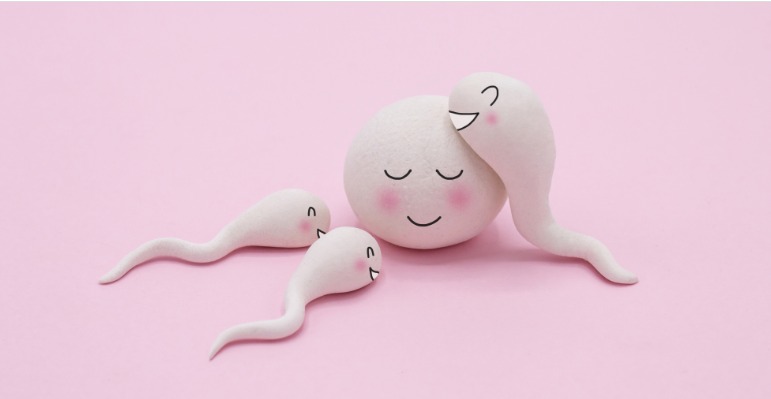If you are considering getting pregnant, there are a few things to consider to prime your body for optimal chances of fertility and healthy pregnancy. There are many natural ways to increase fertility. Ovulating and fertile women have a good chance of getting pregnant within a year if they have regular unprotected sex during their ovulation window.

Making healthy choices with your diet and lifestyle, as well as managing stress, can potentially improve your fertility. It’s also crucial to consult with your healthcare team to get personalized advice and find the best options for your situation. We offer an understanding of lifestyle changes, what to expect when working with your naturopathic doctor and what health benchmarks to aim for when preparing to get pregnant, in our Confident Hormone Club.
Why lifestyle choices count

Food and lifestyle choices to make to improve fertility can start with limiting alcohol consumption and quitting smoking can also make both women and men more fertile. Eating lean meats, getting enough protein from plants, eating whole grains, and having lots of fresh fruits and vegetables while avoiding sugar is also recommended to improve fertility, through the viability of both the sperm and the egg.
Natural ways to increase fertility
There are many natural ways to increase the chances of getting pregnant.
- For men, taking antioxidant supplements or eating foods rich in antioxidants can improve fertility rates.
- Eating a healthy diet with fruits, vegetables, grains, and nuts can also help boost fertility.
- Men should avoid foods high in trans fats to improve the health of their sperm. For women, reducing stress and exercising regularly can increase fertility.
- Eating a healthy diet with plenty of fruits and vegetables can also improve sperm health.
- Men can boost fertility by limiting alcohol consumption and quitting smoking.
- It’s recommended to have a diet with lean meats, plant-based protein, whole grains, lots of fresh fruits and vegetables, and to avoid sugar.
- Women trying to conceive should choose full-fat milk and yogurt instead of low-fat or fat-free options because removing the fat also removes male hormones, which can make it harder to ovulate.
How Dr. Kaylee Alton can help you?
Dr. Kaylee Alton can help you if you’re not sure where to start or want support to assess if there are any reasons you may not be able to get pregnant or to support your body to become as healthy as possible to get and remain pregnant. By joining the Confident Hormone Club to join our community of women looking to improve the individual aspects of their health.
Do prenatal vitamins help you get pregnant?
Prenatal vitamins don’t directly help you get pregnant, but they contribute to the nutrients required to support a healthy progression of pregnancy, once conceived. Prenatal vitamins help prevent certain birth defects. One important vitamin is folic acid, which is a type of vitamin B9. It is important to take it as methyl-folate, as it helps with the development of the baby’s neural tube. It’s recommended to start taking folic acid at least one month before trying to get pregnant and continue throughout pregnancy.
Another important nutrient is iron, which helps with blood supply and is important for both fertility and pregnancy. Omega-3 fatty acids are also beneficial, as they may promote ovulation and blood flow to the reproductive system. Prenatal vitamin combinations can provide the necessary amounts of iron and omega-3 fatty acids that you need on a daily basis.
At-home fertility treatments
There are various fertility treatments that you can try at home. Some options include reducing your daily intake of caffeine and eating foods rich in antioxidants.
Additionally, there are at-home ovulation prediction kits available that can detect the increase in luteinizing hormone (LH) that happens before ovulation, to help you identify this monthly fertility window It’s important to remember that these treatments may not work for everyone, so it’s best to consult with a doctor before attempting any of these methods.
Coffee and Fertility

Consuming 300 mg per day of caffeine (approximately two cups of coffee) increased the chances of early pregnancy loss or spontaneous abortion (SAB), as per Zhang et al, 2020. Zhang et al also highlight the importance of drinking 600 mg of caffeine more than doubled the risk of miscarriage However, caffeine did not affect the time it took for couples trying to conceive naturally to get pregnant. Caffeine intake also did not seem to have a negative impact on pregnancy rates for couples undergoing fertility treatments.
Do energy drinks affect female fertility?
There is currently no solid evidence showing that energy drinks directly impact female fertility. However, it’s essential to understand that energy drinks contain high amounts of caffeine and sugar, which can have negative effects on the body and your overall health. By increasing free radicals and oxidants in the blood, which both sperm and the ovum are incredibly sensitive to .
A study (review of literature by Zhang et al, 2020) says consuming excessive caffeine can increase the chances of early pregnancy loss or spontaneous abortion (SAB) and more than double the risk of miscarriage. It is recommended to consult with a doctor before consuming energy drinks to ensure they are safe for your specific situation.
How to increase fertility with PCOS?
Polycystic ovarian syndrome (PCOS) is a common reason why some people have trouble getting pregnant, and it affects more than 5 million women in the USA according to research.
However, it’s important to know that it is still possible to conceive with PCOS. There are effective fertility treatments available, such as working with your naturopathic doctor to work up your medical case for hormonal production, ovulation, and blood marker status, and your family doctor or gynecologist for a transvaginal ultrasound or sonohistorgram, to determine endometrial health

Making changes to your lifestyle is also crucial. Eating carbohydrates with a low glycemic index, which doesn’t cause a rapid rise in insulin and glucose levels, has been shown to improve fertility in women with PCOS, even without reducing calorie intake. Following a low-calorie, low-carb diet that includes all the necessary nutrients can significantly improve insulin sensitivity and fertility in individuals with PCOS.
Engaging in at least 30 minutes of moderate exercise three times per week is also beneficial. If you have a high body mass index (BMI), losing excess weight can help improve the symptoms of PCOS.
How to increase fertility after 35?
There are several ways to improve fertility after the age of 35. Here are some of them:
- Eat a healthy diet that includes fertility-boosting foods and antioxidants.
- Consider trying a fertility cleanse or an egg health program.
- Learn to track your menstrual cycle and monitor ovulation.
- Quit smoking and avoid secondhand smoke.
- Reduce or eliminate alcohol and caffeine consumption.
- If you’re overweight or obese, aim to lose weight to improve fertility.
- Be cautious of engaging in extremely intense exercise.
- Get tested for and treat any sexually transmitted infections.
- Explore effective methods to manage and decrease stress in your daily life.
By implementing these tips, you can potentially increase your likelihood of getting pregnant.
Additionally, taking prenatal vitamins, particularly those containing folateand Vitamin B, can help prepare your body for future conception.
Fertility test to measure Fertility
When it comes to fertility testing, it typically involves a series of examinations to evaluate your reproductive health. These tests often include laboratory assessments like blood tests and semen analysis for both partners. Additionally, image testing such as ultrasounds may be conducted to examine the reproductive organs of both you and your partner.
Other procedures may also be performed to assess the functioning of your reproductive system. These tests are helpful in identifying any potential issues that could be impacting your ability to conceive.
What are the five components of preconception care?
Preconception care focuses on identifying and addressing potential risks before pregnancy to promote a healthy start. It involves assessing and modifying biomedical, behavioral, and social factors through various interventions. Every woman of reproductive age, regardless of pregnancy plans, can benefit from preconception care. Here are the five key components:
- Risk assessment and health promotion
- Medical and psychosocial interventions
- Reproductive life planning
- Achieving a healthy weight
- Optimizing chronic conditions
To maximize the chances of a healthy pregnancy, it is recommended for women to begin preconception care at least three months before attempting to conceive. This timeframe allows for addressing any existing health concerns that may impact pregnancy and making necessary lifestyle adjustments. By starting preconception care in advance, there is ample time to optimize overall health and increase the likelihood of a successful and healthy pregnancy.
What fertility treatments are covered by OHIP?
OHIP covers various fertility treatments, including:
- Initial fertility consultation
- Most investigative tests
- Most blood tests
- Ultrasound examinations
- Cycle monitoring for diagnosis and treatment
- Intrauterine insemination (IUI)
- Up to two attempts at cycle monitoring
- Embryo freezing, thawing, and culture
- One attempt at surgical sperm retrieval using specific techniques (if needed)
- Fertilization and embryology services, such as intra-cytoplasmic sperm injection (ICSI), assisted hatching, and blastocyst culture
- Transfer of embryos one at a time, whether fresh or frozen
However, it’s important to note that OHIP does not cover fertility drugs.

